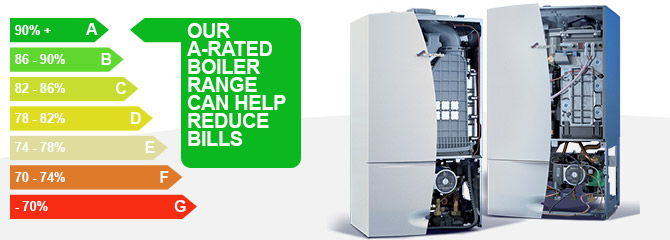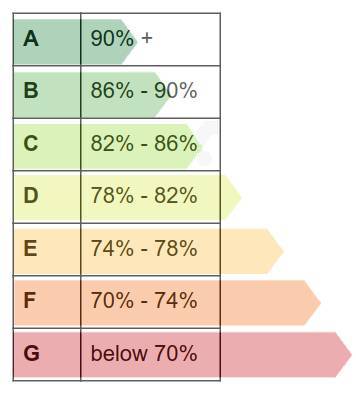Boiler Heating Efficiency and Ratings

Boiler energy efficiency is a critical factor in reducing household energy bills and improving environmental sustainability. Energy-efficient boilers are designed to maximise heat output while minimising fuel consumption, resulting in lower energy costs and reduced carbon emissions. High-efficiency boilers, including condensing and low-energy models, are now widely available for both residential and commercial use.
Boiler efficiency is measured through metrics such as the annual fuel utilisation efficiency (AFUE), thermal efficiency, and energy star boiler rating. Condensing boilers often score higher due to their ability to recover heat from exhaust gases, providing superior performance compared to traditional models.
Table of Contents
What is Boiler Efficiency?
The efficiency of a boiler shows you how much energy it uses to work and how much money you spend on it. The higher the boiler’s rating, the lower its energy consumption is, and the lower energy bills you pay each month.
For example, old boilers didn’t uphold many standards and regulations in the past and don’t have the modern technology we have today. This means that the older your boiler is, the more energy consumption you have. So, choosing the right unit means you save money in the long run.
To help you understand and compare boilers’ efficiencies, there are specific boiler ratings and efficiency charts on every piece of appliance.
Boiler Efficiency Ratings
ErP Rating
ErP stands for Energy-related Products. This directive comes from the European Union and is valid for all member countries. They designed it to drive and increase the improvements in the performance and efficiency of boilers and other water heating systems and to cut down greenhouse gas emissions.
ErP uses the letters from A to G to rank the efficiency of a boiler or a heating system. A is the highest rating and G the lowest. Nowadays, almost all modern boilers have an A rating. There are also different levels of A rating – A+++, A++, A+, or A. In terms of percentage, A-rated boilers equal to over 90% for efficiency, and the G-rated boilers are equal to under 70% efficiency.
SEDBUK Explained
When speaking and reading about boiler efficiency, you will also often see ‘SEDBUK’. SEDBUK stands for Seasonal Efficiency of a Domestic Boiler. This is the way all boilers in the UK are rated for easy comparison. This rating also helps determine a boiler’s carbon footprint.
There are two types, SEDBUK 2005 and SEDBUK 2009. The former uses letters from A to G, where A is the most efficient and G is the least efficient. The latter uses a percentage to show efficiency. Respectively, the higher the percentage, the more efficient the boiler.

However, the SEDBUK rating isn’t used anymore because the ErP rates replaced it in 2015. While the UK government and boiler manufacturers used the SEDBUK rating, the ErP rating is a European directive, and it’s used throughout the continent.
How Efficient is Your Boiler?
Are you now wondering what’s the efficiency of your boiler? To find out, check the sticker on the boiler. It can be anywhere on the boiler, the front, the back or on the bottom. All modern appliances have such a sticker which shows the efficiency rating.
However, if your heating system or boiler is old, it may not have this sticker. Also, you or a plumber may have removed the sticker when you were putting up the boiler. In case there’s no sticker, find the model number, and look for the rating online.
There should be a sticker or a plate under the boiler, where the pipes protrude. Look for the brand and the exact model, maybe even the size. When you gather this information, you can go to the PCDB database and check the efficiency rating of your boiler.
Types of Energy-Efficient Boilers
- Condensing Boilers – Condensing boilers are highly efficient, often achieving over 90% energy efficiency. They capture heat from flue gases that would otherwise escape, reducing fuel consumption and operational costs. Condensing boilers are ideal for both residential and commercial applications, offering top-rated energy performance and sustainability.
- Combi Boilers – Combi boilers, or combination boilers, provide on-demand hot water and central heating without the need for a separate water tank. Their compact design and high efficiency ratings make them popular in modern homes. Look for best-rated combi boilers with high energy efficiency when considering upgrades.
- Oil and Gas Boilers – Both oil and gas boilers can achieve high efficiency when modernised. Oil-fired high-efficiency boilers are suitable for rural homes without gas connections, while gas boilers with energy star ratings remain the standard choice in urban areas.
Boiler size is the other crucial metric you need to consider when choosing the ideal appliance for your home. Naturally, the larger the house, the bigger boiler that is needed. You must also take the number of bathrooms and people who will use the boiler into account when deciding on the size. However, consider the boiler’s location. Will it be in an insulated room or not? Also, will it physically fit into the space you have in mind for its installation?
You Can’t Find Your Model Number?
Unfortunately, there’s a possibility that the plate on the bottom of the boiler is also missing or is unreadable. If that’s the case, then finding out the model number becomes tricky.
What you should do is call a company and hire gas safe registered specialists for a boiler service. Your boiler engineer in London may remove the boiler’s cover and look inside. They could also give you a rough idea of the model if there’s no information but just the type of appliance – condensing boilers or non-condensing.
If yours is non condensing, then it should have a lower efficiency rating. If it’s condensing, then it should be of high efficiency, probably above 85%.
How to Choose the Most Efficient Boiler
If you’re considering changing your old boiler with a new one, you may wonder which is the most efficient boiler. There are a couple of things you should know and think through before deciding on a new type of water heating system.
To work out the total costs and compare boilers, you have to consider:
- The price of the boiler;
- Installation service and does it need additional parts;
- Running costs yearly;
- Annual service;
Condensing vs non-condensing
Condensing boilers outperform traditional models by recovering latent heat from exhaust gases. This results in higher boiler efficiency ratings and lower energy bills. While non-condensing boilers are cheaper upfront, their long-term operational costs are higher due to lower energy efficiency.
Benefits of an Energy-Efficient Boiler
Investing in an energy-efficient boiler delivers multiple benefits:
- Reduced energy bills: Efficient boilers consume less fuel, lowering heating costs significantly.
- Environmental impact: High-efficiency boilers reduce greenhouse gas emissions and contribute to low-carbon living.
- Government incentives: Many regions offer grants or rebates for installing energy-efficient boilers.
- Enhanced comfort: Consistent and optimised heating provides better temperature regulation throughout the home.
- Long-term savings: Modern high-efficiency boilers often have longer lifespans, making them a sound investment.
Tips to Maximise Boiler Energy Efficiency
Even with a high-efficiency boiler, proper maintenance and optimisation are essential. Consider these strategies:
- Regular servicing: Annual inspections and maintenance ensure boilers operate at peak efficiency.
- System upgrades: Installing smart thermostats or modern controls can reduce fuel wastage.
- Heat retention: Insulate hot water tanks and pipework to minimise energy loss.
- Balanced heating: Ensure radiators are correctly sized and maintained to distribute heat evenly.
- Energy audit: Conduct a professional energy efficiency inspection to identify areas for improvement.
How Much Can You Save With an Energy Efficient Boiler
Your boiler is responsible for about 55%-60% of your yearly expenses on energy. If you cut half of these, imagine the amount of money you could save every year. To help you with the calculations here is a breakdown, for a boiler that is rated 70% efficient, out of every £1 spent on heating, 30p is on wasted energy. A more energy-efficient boiler, rated at 90%, you lose only 10p for every £1. When you add the yearly expenses on wasted energy for both types of ratings, you can see a clear difference.
As of April 2018, the ErP came into force, which establishes a required minimum for all gas boilers in England to be rated at least 92%. They enforced this directive with several goals in mind. The primary goals are fewer greenhouse gas emissions in Europe, improvement of the overall energy efficiency on the continent, and ideally, increased use of renewable energy sources.
So, here is an example of how much money you can save yearly if you install an A-rated boiler instead of the following.
| Type of boiler | Detached house | Semi-detached house |
| D-rated (78-82%) | £170 | £110 |
| F-rated (70-74%) | £220 | £145 |
| G-rated (<70%) | £315 | £205 |
These calculations are valid for homes in England, Scotland, and Wales. Source of information: Energy Saving Trust
How to Improve Your Boiler Efficiency
Knowing how much your boiler costs you yearly is a good reason to want to improve its efficiency. But if you’re asking how to improve boiler efficiency and if it can be done quickly and cheaply, here we list several things that can help improve boiler efficiency.
Seasonal Settings
Installing a new, more efficient boiler doesn’t mean you’re set and you can forget about it. The settings on the boiler can affect its efficiency a lot. Naturally, you wouldn’t want to keep the high temperature in your home in the warm months. So, changing the settings on the heating system or boiler seasonally can help you reduce your running costs. If you’re not convinced of your skills to deal with the system, you can hire a qualified Gas Safe/Corgi registered plumber to check them out and fix them.
Regular Maintenance and Diagnostics
To improve boiler efficiency, regardless of type, model, or brand, it’s crucial to have regular maintenance and diagnostics. Doing it prolongs the life of your appliance and, with regular maintenance and cleaning, its efficiency will remain the same.
Professional diagnostics can determine if you set the system to the most efficient setting. Also, the expert can remove dirt and corrosion build-up. You can get helpful tips about boiler maintenance and how to prevent corrosion in the future, or at least until the next scheduled diagnostics.
Hydronic Balancing
Hydronic balancing means that all radiators have the exact supply of heat they need. A professional can perform this or you can try it yourself.
To do this task, you must first close all radiator valves. Turn on the central heating and start opening the valves one by one, going further away from the boiler. When all the radiators get warm, this means they are balanced. This simple process can improve boiler efficiency by up to 15%.
Invest in a New Unit
If your unit is old but you want to make it more efficient, the easiest thing to do is install a new boiler. Depending on how old and what type and model your unit is, it may cost you more to transform it into something more efficient. In the big picture, it will be the most cost and energy-efficient option for you.
Takeaways
Optimising your home or business heating system with an energy-efficient boiler is both financially and environmentally prudent. Understanding boiler efficiency ratings, selecting the right type, and maintaining the system properly ensures maximum energy savings, improved comfort, and a reduced carbon footprint. Whether choosing a high-performance combi boiler for a small home or a commercial condensing boiler, energy efficiency should always be a top priority.
Consider a professional energy audit for boilers, compare boiler efficiency ratings, and explore government incentives to make the switch to an energy-efficient boiler today.
Boiler Heating Efficiency and Ratings
Need help? Hire the London Property Service experts today by giving us a call on 020 3078 5920.




